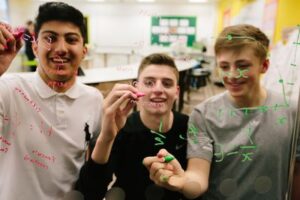Monitoring, Challenge, Support & Impact in the Classroom
MONITORING
The progress of the most able students is tracked each term. Support is then put in place to ensure that the most able students are making good progress. Where specific needs or trends are identified, interventions and/or focused targets for students will be recommended. The More Able and Talented Co-ordinator works with Head of Department to ensure that student needs are met.
- More Able Co-ordinator monitors the consistency and impact of provision across the academy
- Heads of Departments monitor the impact of provision for students gifted in their relevant subjects and this provides the basis for the Department Development Plans
- Heads of Year monitoring and evaluation progress across a range of subjects, this information informs the intervention and support strategies.
- Students exceeding or not meeting targets will be mentored and effective interventions will be implemented. The impact of these interventions will be monitored.
CHALLENGE
Opportunities to provide additional support to challenge the more able students are embedded within the curriculum and offered in all lessons across all key stages. Each Head of Department works with the More Able and Talented Co-ordinator to ensure that teachers know who their most able students are, and that sufficient challenge and rigour are embedded within the curriculum to cater to student needs.
Our Learning, Teaching & Assessment Framework emphasises student independence through the development of high-level behaviour for learning skill. Based on expectation that all students will be challenged and supported to make the most progress possible given their starting point, it is underpinned by a quality first teachingapproach based on an understanding of starting points, robust ongoing assessment of progress and a shared assessment outcomes (strengths and areas for improvement) and consistent and regular student response to feedback.
When planning the focus for stretching the more able is:
- Broadening learning (going beyond the prescribed curriculum e.g.: just because they are in Year 7 does not mean they cannot attempt a GCSE question)
- Deepening learning (developing mastery through application, evaluation or creating – layering challenge)
- Linking learning (making connections with prior learning, other subjects e.g.: through problem solving and critical thinking)
More Able students achieve their potential through:
- High challenge in lessons
- Choice
- Exploration
- Inquiry
- Thinking skills
- Connections within and between curriculum areas
- Developing independent learning skills
Within lessons more able learners are challenged in lessons through:
- Opportunity to work at increased pace
- To start from what they already know- which may be more than everyone else
- Less practice at tasks
- Less detailed inspection
- More independence of study
- A reduced number of steps in a process
- Open-ended situations
- More problem solving
- Abstract tasks
- The need to Fail
- A wide variety of opportunities
- Creative opportunities
- Space to experiment
- More challenging open questions
- The opportunity to take risks
Principles of a Differentiated Curriculum for More able learners
- Content that is related to broad issues, themes or problems
- Choice of task/topic
- Opportunity to develop independent study skills
- Opportunity for in depth learning of a topic
- Open-ended tasks
- Develop and practice research skills and methods
- Integrate higher level thinking skills- Blooms Taxonomy:
- Encourage the development of products that challenge existing ideas and produce ’new’ ideas
- Develop products using new techniques, materials and forms
- Metacognition- become more aware of how they are learning
- Self-assessment
A Checklist of Approaches to Differentiation
| By Task | Open-ended activities Support/Core/Extension Must/Should/Could Higher level ideas | Use and Apply Small steps/prompts Challenge Corner Differentiated homework |
| By Support | Use of TAs Other adults- speakers Mentors Extra time | Resources More prompts Fewer prompts Teacher intervention |
| By Pace/Time | Less time Waiting time in response to teacher questions | Time for review/ evaluation Menu to work through |
| By Interest | Select from menu Brainstorming Students involved in planning | Devising own challenges Research |
| By Resource | Bank of materials Complex texts | Varied pics/artefacts |
| By Recording | Spoken Written | ICT Graphical |
| By Organisation | Learning Styles | Location of resources |
| By Student Expertise | Groupings: reading/writing partners Think/pair share Hot seating | Group composition: thinker, ideas person, writer, drawer, presenter |
| By Talk/Questioning | Teacher interventions/ questions Level, speed, sophistication of language | Debates/discussions Thinking skills Higher order questioning/thinking Open/closed talk |
CHARACTERISTICS OF EFFECTIVE TEACHING
- Lesson planning which accommodates the needs of more able learners
- Recognising and building on what learners already know and setting out appropriate objectives
- A classroom culture of high expectations and aspirations, in which achievement is celebrated and learners of all abilities are valued
- Presenting the curriculum as a series of real life problems to be solved
- The use of varied teaching approaches to make learning engaging and challenging
- Matching tasks to learner’s maturity and preferred learning styles
- Encouraging independent thinking and open inquiry
- Selecting and using questions that stimulate higher order thinking
- Encouraging and supporting learners in asking their own questions
- Promoting and modelling a variety of thinking skills
- Modelling and requiring learners to use effective problem solving techniques
- Using classroom discussion effectively
- The use of peer and self assessment to make young people partners in their learning, to help them assess their own work and to reflect on how they learn and inform subsequent planning and practice
- Stimulating and paying attention to the student voice
- Linking out of class experiences with day to day learning
CREATING A POSITIVE LEARNING ENVIRONMENT
Consett Academy appreciates that More Able learners need to:
- Have a stimulating environment, with access to high quality resources
- Know that they can ask searching questions and get a considered response
- Receive appropriate encouragement and praise
- Be recognised as individuals with strengths and weaknesses
- Be able to hold meaningful discussions with the teacher, other adults and other young people
- Be highly engaged
- Have independence, with students having control over learning and assuming responsibility for their learning and behaviour
- Develop confidence in their own abilities, with self esteem and strong social skills
- Develop maturity in student relationships and the development of mutual respect for staff and peers
SUPPORT
Provision for MAL and HPP students will take account of possible particular needs of these students. Social and emotional needs are met by:
- the security to relax, enjoy learning and display their ability
- the opportunity to experience failure
- support from teachers who understand their strengths and weaknesses
- encouragement to ask searching questions and receive a considered response
- praise and recognition for their achievements
- the engagement of parents in meeting their particular learning needs
- opportunities to work in a team
- encouragement to value the contributions of others
- encouragement to co-operate and seek advice
- encouragement to be confident and modest in their talents
- monitoring and mentoring procedures
IMPACT
- The use of effective Assessment for Learning that informs the planning of challenging curricular activities
- Additional stretch being provided through a combination of enrichment, extension and acceleration
- Differentiating learning objectives
- Supporting learners in specific areas highlighted through the use of Individual Learning plans and teacher knowledge
- Developing opportunities for independent learning
- Integrated learning in settings beyond the classroom

 Parentpay
Parentpay Local Offer
Local Offer








